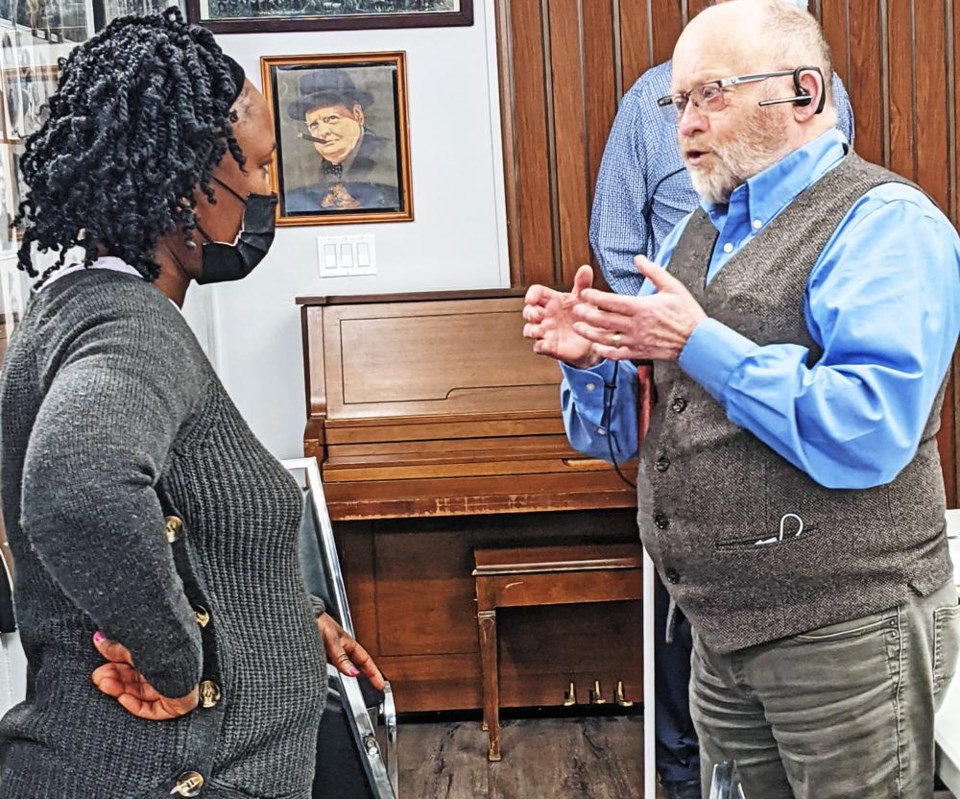WEYBURN – Weyburn pastor Victoria Mwamasika shared photos and stories from her homeland of Tanzania, in a presentation to the Weyburn Rotary Club on Thursday, and related how Rotary Clubs have helped people in her country with various projects.
She has lived in Canada since 2003, and has served at Zion Lutheran Church for the past four years. Her two children, a daughter and a son, attend the Weyburn Comprehensive School.
“It’s a nice lovely community, and my kids love it a lot,” she said. “I’m still learning a lot about Canada, and especially about winter.”
She noted Tanzania is the largest country in East Africa, about twice the size of California, bordered by the Indian Ocean and by eight countries. It is the home of Mount Kilimanjoro, the highest point in Africa, and has a population of 59.7 million.
The country is home to 125 tribes, but they are united by using a common language, Swahili, which “has helped us to stay stronger. Language, food and culture unite people,” said Mwamasika, adding the country gained its independence in 1961.
Explaining some of her country’s customs, she noted arranged or “prepared” marriages are still customary for some tribes and families, although the government is working to end this practice.
One of the challenges is when girls are set to be married with an older man from a young age.
“Girls can access education, but sometimes it can be a challenge. These young girls … they don’t want to be married at that young age. I remember in seminary, I had a friend who had a friend who wanted to run from home because of a prepared marriage. It was a challenge for me, but fortunately there was a school where she was able to stay and hide from her family,” she said. “Not all tribes do this, as the government is doing well to eradicate this culture.”
Mwamasika was last able to visit her home country in 2019, and her children accompanied her, with a visit to some orphanages as a part of their stay.
She was able to take blankets to them, and dresses that had been made by a small group of women in Grenfell, and the girls were so excited and happy to receive them. “It was like we had sent God to them,” said Mwamasika.
“I asked my kids, ‘do you know how lucky you are?’,” she said. “It was so meaningful for my kids to know there are some kids who have no place to sleep, no place to call home.”
There are many non-government organizations (NGOs) and agencies that help out in Tanzania, including Rotary Clubs, both from outside the country and those established in the country, said Mwamasika.
“Thank God for NGOs like Rotary to make sure some of these girls can go to school. Rotary Clubs help a lot,” she added.
The oldest Rotary club in Tanzania is in the city of Dar es Salaam, and was established in 1949, and they have been involved in many projects to help people. She showed photos of young people who are involved with that club as they prepared to plant trees as one example.
“They are reaching out … I’m challenging you to be outreach Rotarians,” she said. “You’re doing a good thing here, but remember to be an outreach club.”
Other projects that have helped include one to eliminate malaria in Tanzania, in part by distributing mosquito nets to families, and another is to help provide clean sources of water.
“In very rural areas, there is no clean water. They have built wells with the help of international club, but locals are so much involved too,” she said.
Mwamasika also noted that children in Tanzania often don’t celebrate Christmas the way Canadians do, with lots of presents, but she noted a Rotary Club has made it a project to provide Christmas presents for families.
“For me, a gift to celebrate Christmas was to have a pop, like a Pepsi,” she said.




